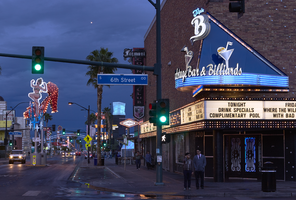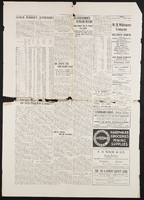Search the Special Collections and Archives Portal
Search Results
Bob Friedlander Jazz Music Manuscripts
Identifier
Abstract
The Bob Friedlander Jazz Music Manuscripts (approximately 1960-1980) are comprised of music manuscripts arranged by Bob Friedlander and collected by the Arnold Shaw Popular Music Research Center at the University of Nevada, Las Vegas (UNLV) in Las Vegas, Nevada. Some titles are photocopies of the original manuscript. Friedlander arranged for big band musicians such as Harry James, Sam Donahue, Richard Maltby, Ralph Flanagan, and Johnny Long.
Archival Collection
Dorothy Keeler Papers
Identifier
Abstract
The Dorothy Keeler Papers (1811-1977) document early Las Vegas history, the life and career of former United States Mint director Eva Adams, and contain images of the Western United States and Southern Nevada in the 1930s. The collection contains clippings on the history of Las Vegas and early Las Vegas weddings as well as photographs documenting the Keelers' travels throughout the Western United States and the construction and dedication of Hoover Dam.
Archival Collection

Transcript of interview with Judge Lee Koury by Claytee White, February 6, 2013
Date
Archival Collection
Description
Born in 1932 and raised in Los Angeles; mother was a housewife and later became a painter; mention of Olvera Street; Pio Pico first Mexican governor of California; Pico House; member of the Army; Deputy Sheriff; Mother Pauline Brown and father Lee Koury; Los Angeles County Sharon Tate; LaBiancas; Spahn Ranch; "the three girls on the comer" - Lynette Fromme, Sandra Good, and Nancy Pitman; Family - referring to the Manson case - Charles Mason, Robert Beausoleil, Susan Atkins, Steve Dennis Grogan, Patricia Kernwinkle, Mary Theresa Brunner, Bruce McGregor Davis, and Leslie VanHawten; Shorty Shay the person in charge at Spahn Ranch; mention of Polaroids mailed to prisoners that ended up being an important part of the Manson case.
Text

Photographs of Backstage Bar & Billiards, Las Vegas (Nev.), 2016-2017
Date
Archival Collection
Description
Site address: 601 Fremont St
Sign owner: DJ Lethal co-owned with DJ Scotty
Sign details: This building dates back to 1957. Triple B opened in 2012 as a billiard hall bar and concert venue. It is filled with a lot of Rock Memorabilia which includes a "turntable library" which they claim showcases over 8 decades of rock history. This location was furnished by rock outfitter Anvil Cases. This property got its name by being "backstage" to the adjoining Fremont Country Club.
Sign condition: 5- looks relatively new and still in great condition
Sign form: Variation of a Bull Nose Sign
Sign-specific description: Their entrance is on the corner of 6th (going South) and Fremont with a blue bull nose type sign in a triangle shape. The base of the triangle sign is right above the entrance. The triangle border has a blue (argon) strip with incandescents lining both sides of the neon tubing. At the base of the sign there is a blue (argon) curved platform (half circle placed adjoining to the base of the triangle). On this platform there are 5 separate strips of argon tubes. Above the platform states "Backstage Bar & Billiards" in white cursive channeled letters. Above the words Backstage and Billiards there are two martini glasses with a pool ball and flag in each glass. At the top of the triangle portion of the sign there is their logo "Triple B" in cursive with Triple in Blue and B in white. Below the bull nose sign there is a reader board that wraps around the building. This reader board is also lined with incandescent light bulbs. In the middle of the of the reader board there is a black background rectangle with 3 rhombus's lined in incandescent light bulbs in a design.
Sign - type of display: Neon, incandescent and reader board
Sign - media: Steel and Plastic
Sign - non-neon treatments: Reader Board
Sign animation: Flasher for incandescent light bulbs
Sign environment: Fremont East district East District, next to other bars and restaurants. This location is right across the street from the El Cortez. Also they claim to be "backstage" to the adjoining Fremont Country Club which inspired their name.
Sign manufacturer: Ultra Signs' recently bought out by Jones Las Vegas ( of Jones SIgns) who did not have records of this sign.
Sign - date of installation: 2012 when the bar opened
Sign - thematic influences: On Fremont many of the entrances are at the corner intersections, so the bull nose sign has been prominent design type to draw attention to the entrance of the company. This is remnant of the Golden Nugget and Binion's Horseshoe put up their bull nose signs in 1961.
Sign - artistic significance: The curved platform at the bottom of their bull nose sign looks like an old retro movie theater style sign platform that you would see in the 1940's/50's. Particularly with their reader board with incandescent light bulbs speaks to this era as well.
Survey - research locations: Assessor's page, triple B website http://www.backstagebarlv.com/ , Las Vegas Weekly Newspaper article https://lasvegasweekly.com/nightlife/lowball-diary/2012/dec/05/triple-b-fills-downtowns-watering-hole-hole/
Survey - research notes: Fremont Bars.com has a photo of their main sign being installed. http://www.fremontstreetbars.com/2012/11/29/welcome-to-the-neighborhood-backstage-bar-billiards/
Survey - other remarks: The Ultra Signs logo is visible on the left side of the sign.
Surveyor: Emily Fellmer
Survey - date completed: 2017-08-11
Sign keywords: Neon; Incandescent; Steel; Plastic; Flashing; Reader board; Bullnose; Marquee
Mixed Content

Meeting minutes for Consolidated Student Senate University of Nevada, Las Vegas, September 19, 1985
Date
Archival Collection
Description
Text
Red Rock Canyon National Conservation Area Records
Identifier
Abstract
The Red Rock Canyon National Conservation records (1965-2007) contain information about the Red Rock Canyon National Conservation Area (previously the Red Rock Canyon Recreation Lands). It largely consists of newspaper clippings on a variety of events related to Red Rock Canyon from 1965 to 1998 with the bulk from the 1980s and 1990s. The records also include Bureau of Land Management documents pertaining to interpretive efforts, visitation statistics, and law enforcement reports. Also included are the newsletters (1990-1998) and volunteer training manual of the Friends of Red Rock Canyon, a non-profit volunteer organization.
Archival Collection

Transcript of interview with Gil Cohen by Claytee White, August 5, 2014
Date
Archival Collection
Description
Interview with Gil Cohen by Claytee White on August 5, 2015. In this interview, Cohen discusses growing up in Las Vegas and attending University of Nevada at Reno. He returned to Las Vegas to join the management training program at the Stardust. He talks about his friendships with Moe Dalitz and Carl Cohen, and his interest in golfing. He also discusses corporate ownership of casinos, unions, and his experiences working at different Strip hotels.
Gil Cohen came to Las Vegas in 1957, when was ten years old, when his father, Yale Cohen, was recruited by Moe Dalitz to work at the Stardust Hotel and Casino. Cohen graduated from University of Nevada Reno, and started working at the Stardust through the management-training program. In 1975, he was made hotel manager, his first of many leadership positions in Strip properties, which have included the Dunes, Aladdin, Hacienda and Monte Carlo, where he currently works as a casino host.
Text
Harmon Family Papers
Identifier
Abstract
The Harmon Family Papers consist of the political and personal correspondence of Las Vegas, Nevada pioneer Harley A. Harmon from 1910 to 1934, and his son, Harley E. Harmon, from 1950 to 1966. The collection also includes correspondence, personal papers, and photographs of Harley L. Harmon from approximately 1950 to 1999. Also included are family scrapbooks with wedding announcements, photographs, birthday cards, newspaper clippings, and other ephemera.
Archival Collection
Gene Hertzog Professional Papers
Identifier
Abstract
The Gene Hertzog Professional Papers (approximately 1930-2015) are comprised of photographs, slides, transparencies, publications, video cassettes, correspondence, and digital files spanning Gene Hertzog's working years with the United States Army, the Bureau of Reclamation, and as a freelance photographer and videographer based in Southern Nevada, New Mexico, and Washington state. The collection documents the complicated infrastructure required to supply water to the Las Vegas Valley and includes still and moving images of the Springs Preserve, Lake Mead National Recreation Area, the Colorado River, and the Columbia Basin. The majority of the collection comes from Hertzog's time as a regional photographer for the Bureau of Reclamation and offers a unique glimpse into the Bureau's work in Southern Nevada, the southwest, and the Pacific Northwest from the 1950s to the mid-1990s.
Archival Collection

